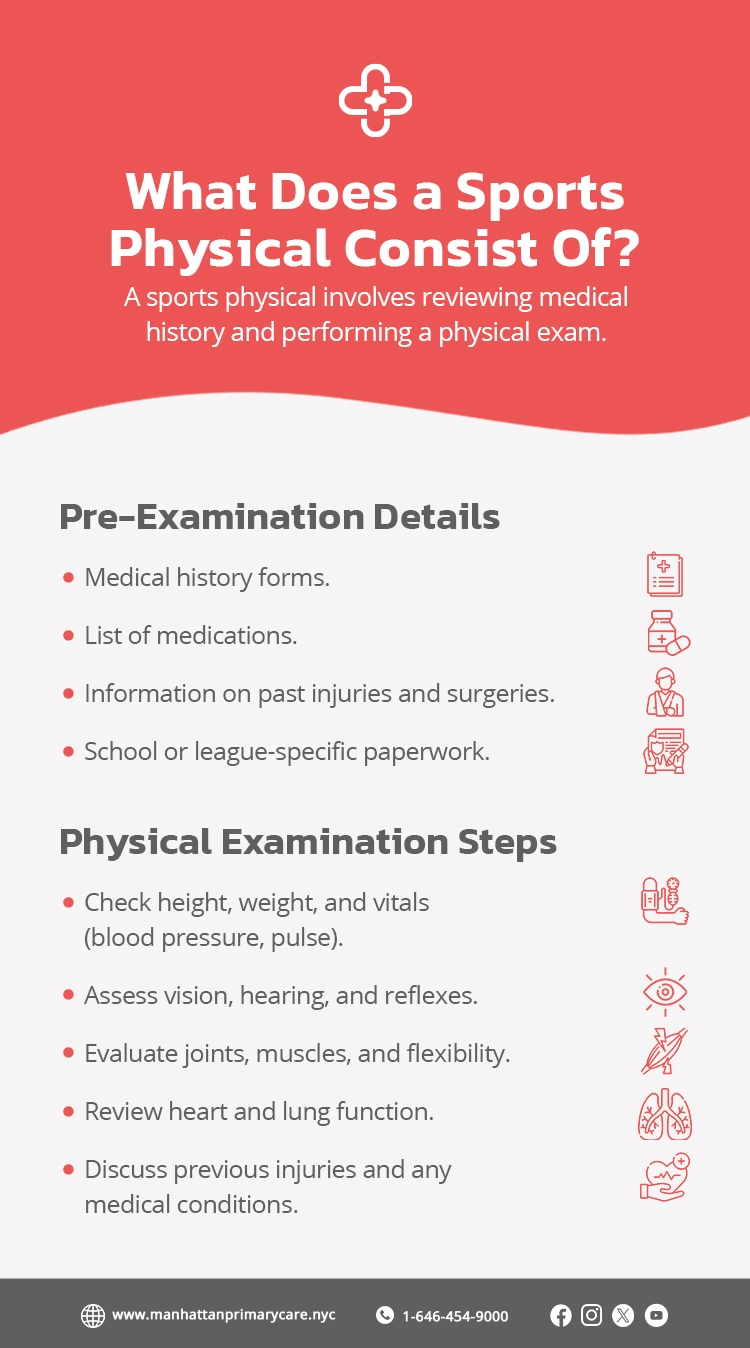A sports physical, also known as a pre-participation physical examination (PPE), is an essential checkup for athletes to ensure they are fit for physical activity. Whether you’re a student preparing for the new sports season or a parent ensuring your child meets school requirements, finding a location for a quick sports physical is crucial. In this guide, we’ll cover everything you need to know about sports physicals, including where to get one ASAP, costs, requirements, and differences from a regular physical.
What Is a Physical for Sports?
A sports physical is a medical examination designed to assess an athlete’s overall health, fitness level, and ability to participate safely in sports activities.
Importance of a Sports Physical for Athletes
Sports physicals help identify potential health concerns, such as heart conditions, joint problems, or past injuries, that could put an athlete at risk. They also ensure compliance with school, league, or state regulations regarding athletic participation.
How Long Is a Sports Physical Good For?
A sports physical is typically valid for one year. However, some organizations may have specific requirements, so it’s best to check with your school or league. Annual sports physicals help monitor changes in an athlete’s health and fitness.
What Does a Sports Physical Consist Of?
A sports physical involves reviewing medical history and performing a physical exam.


Pre-Examination Details
Before the physical, you will need:
- Medical history forms.
- List of medications.
- Information on past injuries and surgeries.
- School or league-specific paperwork.
Physical Examination Steps
The doctor will:
- Check height, weight, and vitals (blood pressure, pulse).
- Assess vision, hearing, and reflexes.
- Evaluate joints, muscles, and flexibility.
- Review heart and lung function.
- Discuss previous injuries and any medical conditions.
Sports Physical Requirements
General Requirements
Most sports organizations require:
- A completed medical history form.
- Clearance from a healthcare provider.
- Signed consent from a parent or guardian (for minors).
Specific Requirements for Certain Sports
High-impact sports like football or wrestling may require additional health screenings, while endurance sports may emphasize lung function tests.
Sports Physical Examination
- Medical History Review: Checking past illnesses, surgeries, and family history.
- Vital Signs Measurement: Blood pressure, heart rate, and weight.
- Vision and Hearing Tests: Ensuring the athlete can see and hear properly.
- Musculoskeletal Examination: Evaluating flexibility, strength, and joint function.
- Cardiovascular and Respiratory Check: Listening to the heart and lungs.
- Doctor’s Recommendations: Providing clearance or suggesting further testing if needed.
Why Do You Need a Physical to Play Sports?
A sports physical helps prevent injuries, detect potential health risks, and ensure athletes can safely participate in physical activities. Many schools and sports leagues require them as a precautionary measure.
Kids Sports Physicals: Where to Get Them Quickly
For fast and convenient sports physicals for kids, try:
- Walk-in Urgent Care Clinics: Same-day appointments available.
- Retail Clinics (CVS, Walgreens, Walmart): Affordable and quick services.
- Primary Care Physicians (PCP): Requires scheduling but provides comprehensive care.
- School-Organized Physicals: Check if your child’s school offers group physicals before the season starts.
Boys vs. Girls Sports Physicals: Is There a Difference?
While the general structure of a sports physical is the same for both boys and girls, there may be gender-specific discussions, such as:
- For Boys: Hernia checks may be included.
- For Girls: Menstrual health and bone density may be addressed.
The Difference Between a Sports Physical and a Regular Physical
Feature | Sports Physical | Regular Physical |
Purpose | Approves participation in sports | General health maintenance |
Focus | Joints, flexibility, injury risk | Overall wellness, chronic conditions |
Duration | 15-30 minutes | 30-60 minutes |
| Insurance Coverage | Usually not covered | Often covered |
How Often Do You Need a Sports Physical?
Most schools and sports organizations require a sports physical once a year. If an athlete has a major injury or health concern, additional evaluations may be necessary before returning to sports.
Conclusion
Getting a sports physical is essential for ensuring safe athletic participation. If you need a sports physical ASAP, consider urgent care clinics, retail health clinics, or school-organized exams. Always check your specific league or school requirements and make sure you have the necessary paperwork prepared in advance. By staying proactive, athletes can focus on their performance while staying healthy and injury-free.
Frequently Asked Questions
What documents do I need for a sports physical?
A completed medical history form (provided by your school or sports organization). A list of current medications and past surgeries. Parental/guardian consent (if under 18). Vision prescription (if you wear glasses or contacts).
Can I get a sports physical without insurance?
Yes, a sports physical can be done without insurance. Many providers offer cash-pay options.
Can a sports physical detect serious health issues?
Yes, sports physicals assess heart health, lung function, joint stability, and overall fitness. While they don’t replace a full medical checkup, they can help detect high blood pressure, heart murmurs, breathing issues, or past injuries that may need further evaluation.
What happens if I don’t pass my sports physical?
If you don’t pass, your doctor may: Recommend further testing or specialist evaluation (e.g., cardiologist, orthopedic specialist). Suggest temporary restrictions or treatment for underlying conditions. Allow clearance with modifications (e.g., using a brace or inhaler). If a condition is serious, they may not clear you for sports until treated.
How soon before the sports season should I get my physical?
It’s best to get your sports physical at least 4–6 weeks before the season starts. This allows time for follow-ups, additional tests, or treatment if needed. Some schools require physicals to be completed within a specific timeframe, so check their guidelines.
Why do some sports require additional health screenings?
High-contact or endurance sports, such as football, wrestling, and long-distance running, may require additional cardiovascular, neurological, or orthopedic screenings to assess injury risks. These tests help ensure athletes are physically capable of handling the sport’s demands safely.
Disclaimer
This blog is for informational & educational purposes only and does not intend to substitute any professional medical advice or consultation. For any health-related concerns, please consult with your physician, or call 911.
